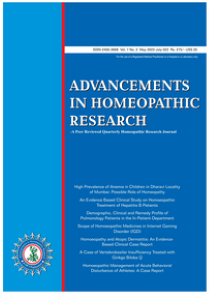In-vitro Evaluation of Impact of Forbidden Items on the Efficacy of Homoeopathic Medicines
Keywords:
Candida albicans, beverages,, forbidden items, intoxicants, homoeopathic medicine, in-vitro inhibitory effect, biological experimental model, disc method, zone of inhibition techniqueAbstract
From the time of Dr. Hahnemann, Homoeopathic physicians have been very particular about the diet during treatment owing to general belief that the effect of remedy would be antidoted by anything which has strong odour or having medicinal properties. Even today, Homoeopathic physicians have varied opinion on these dietary restrictions. Majority of Homoeopathic physicians restrict all the articles which have strong smell or possess some medicinal property while restriction by some are limited considering the nature of disease and remedy. Another category of Homoeopathic physicians, though meagre in number, usually do not impose any dietary restrictions.
Gupta et. al. had already demonstrated through the in-vitro experiments that various commonly restricted edible items do not neutralize the action of
Homoeopathic medicines and such restrictions are unscientific.
The aim of this in-vitrostudy was to provide experimental proof, to validate or dismiss the belief of contemporary homoeopathic physicians of restricting beverages like tea, coffee and some other items like tobacco and bhang.
The result of these experiments have shown that there is no effect of these restricted items on the inhibition in growth of human pathogenic fungus Candida albicans by Mezereum 200 in in-vitro condition.
This experiment is only an effort to elicit the effect of above mentioned items on the inhibition in growth of human pathogenic fungus Candida albicans by Mezereum 200 in in-vitro condition and it should not be taken that the authors by any means advocate the intake of above mentioned items.




